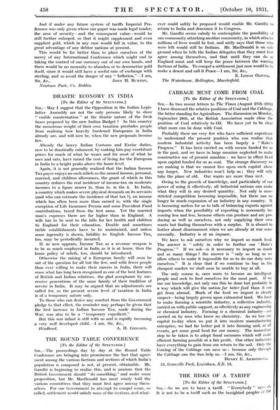DRASTIC ECONOMY IN INDIA
[To the Editor of the SPECTATOR.] SIR,—May I suggest that the Opposition in the Indian Legis- . /ative Assembly are not the only persons likely to show "visible consternation " at the drastic nature of .the fresh taxes proposed by the new Indian Budget ? In this country the monstrous weight of their own taxation precludes people from realising how heavily burdened Europeans in India already are, and will now be, when the new proposals become law.
Already the heavy Indian Customs and Excise duties, now to be drastically enhanced, by making him pay exorbitant prices for much of what he wears and for most of what he uses. and eats, have raised the cost of living for the European in India to a height peaks above the home level.
Again, it is not generally realized that the Indian Income Tax payer enjoys no such reliefs as the earned income, personal, married, and children allowances, the grant of which in this country reduces the real incidence of income-tax on moderate incomes to a figure nearer 2s. than 5s. in the £. In India, a country which makes severe physical demands on its servants (and who can estimate the incidence of that tax ?), an income which has often been more than earned is, with the single exception of Life Insurance Premia and some Provident Fund contributions, taxed from the first anna. Yet the married man's expenses there are far higher than in England. A wife has to be sent to the hills for her health and children to England for their education. Double and sometimes treble establishments have to be maintained, and unless some ingenuity is shown, liability to English Income Tax, too, may be periodically incurred.
If, as now appears, Income Tax as a revenue weapon is to be as much employed in India as it is at home, then the home policy of reliefs, too, should be introduced.
Otherwise the raising of a European family will soon be out of the question for all but the few, and with fewer people than ever willing to make their careers in India, there will cease what has long been recognized as one of the best features of British and Indian relations, the glad acceptance by suc- cessive generations of the same family of their tradition of service in India. It may be argued that no adjustments are called for, as the present severe level of taxation in India is of a temporary nature only.
To those who can derive any comfort from the Government pledge to that effect, the reminder may perhaps be given that the first increase in Indian Income Tax, made during the War, was also to be a " temporary expedient."
But this war infant is still with us and is rapidly becoming a very well developed child.—I am, Sir, &c.,


















































 Previous page
Previous page